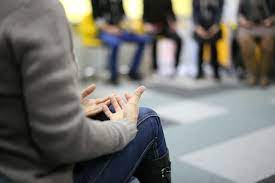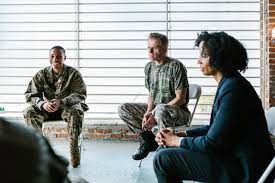Depression is a common mental health disorder that can affect teenagers making them sad, hopeless, and disconnected from others. While individual therapy can be helpful, group therapy can also be an effective form of treatment for teenage depression. In this blog, we will explore the benefits of teenage depression group therapy, how it works, and how to find a therapist that offers this type of therapy. We will also discuss different activities that are used in group therapy for teenagers. If you or someone you know is struggling with teenage depression, read on to learn more about how group therapy can help.
Contents
What Is Teenage Depression?
 Teenage depression is a mental health disorder that affects adolescents between the ages of 13 to 18. It is characterized by persistent feelings of sadness, hopelessness, and worthlessness, and may also cause irritability, fatigue, changes in appetite and sleep patterns, difficulty concentrating, and thoughts of self-harm or suicide.
Teenage depression is a mental health disorder that affects adolescents between the ages of 13 to 18. It is characterized by persistent feelings of sadness, hopelessness, and worthlessness, and may also cause irritability, fatigue, changes in appetite and sleep patterns, difficulty concentrating, and thoughts of self-harm or suicide.
Teenagers who experience depression may withdraw from social activities, have trouble in school, and have strained relationships with family and friends. It is important for teenagers who exhibit symptoms of depression to seek professional help.
Is Group Therapy Effective For Teenage Depression?
Yes, it is effective in treating the condition. Teenage Depression Group therapy provides a supportive and non-judgmental space for teenagers to connect with those having similar issues. This can help reduce feelings of isolation and improve self-esteem. Group therapy also provides an opportunity for teenagers to learn new coping skills and strategies from both their peers and the therapist leading the group. In addition, group therapy can be more cost-effective than individual therapy and may provide a greater sense of community and belonging for participants. However, the effectiveness of group therapy for teenage depression can vary depending on the specific needs and circumstances of each individual.
How Does It Work?
The process of delivering teenage depression group therapy typically involves several steps, including:
- Assessment: The therapist conducts an initial assessment to determine whether group therapy is an appropriate treatment option for the teenager’s depression. The assessment may involve questions about the teenager’s symptoms, history, and current circumstances.
- Group formation: The therapist forms a group of teenagers who are experiencing similar symptoms or issues related to depression. The group typically consists of 6-10 teenagers and meets regularly, such as weekly or bi-weekly.
- Group sessions: The group sessions are structured to provide a supportive and non-judgmental environment where teenagers can share their experiences and feelings related to depression. The therapist may use various techniques, such as cognitive-behavioral therapy, interpersonal therapy, or mindfulness-based approaches, to help the teenagers develop coping skills and improve their emotional well-being.
- Psychoeducation: The therapist may provide psychoeducation on depression, its symptoms, causes, and treatment options. This can help teenagers understand their condition better and reduce the stigma associated with mental health disorders.
- Homework: The therapist may assign homework or activities for the teenagers to complete between group sessions. This can include practicing coping skills, journaling, or engaging in other activities that promote self-care.
- Termination: The therapist helps the teenagers prepare for the end of group therapy by reviewing progress made, discussing challenges, and identifying ongoing support and resources.
Activities In Teenage Group Therapy
Here are some activities that are used to treat teenage depression in group therapy:
Mindfulness exercises
 Mindfulness exercises involve paying attention to the present moment. It also involves being aware of one’s thoughts, feelings, and bodily sensations without judgment. In group therapy, it can include deep breathing, meditation, or Yoga. These exercises can help teenagers learn how to manage stress and anxiety, reduce symptoms of depression, and improve their overall well-being.
Mindfulness exercises involve paying attention to the present moment. It also involves being aware of one’s thoughts, feelings, and bodily sensations without judgment. In group therapy, it can include deep breathing, meditation, or Yoga. These exercises can help teenagers learn how to manage stress and anxiety, reduce symptoms of depression, and improve their overall well-being.
Cognitive-behavioral activities
CBT is a type of therapy that focuses on identifying and changing negative thought patterns and behaviors that contribute to depression. In teenage depression group therapy, CBT activities may include identifying negative thoughts and beliefs and creating positive affirmations. It may also include practicing relaxation techniques or engaging in exposure therapy to overcome fears and anxieties.
Creative activities
Creative activities, such as art therapy or music therapy, can provide a way for teenagers to express themselves and their emotions in a nonverbal way. In teenage depression group therapy, these activities may include drawing, painting, collaging, playing music, or writing poetry. These activities can help teenagers develop a sense of self-expression and empowerment, reduce feelings of isolation and loneliness, and improve their overall well-being.
Role-playing
Role-playing involves practicing communication and problem-solving skills in a safe and supportive environment. In teenage depression group therapy, role-playing may involve practicing assertiveness skills, conflict resolution skills, or social skills. These activities can help teenagers build confidence, improve their relationships with others, and reduce feelings of anxiety or stress.
Group discussions
 Group discussions provide an opportunity for teenagers to share their experiences and feelings related to depression, learn from one another, and provide support to their peers. This may include topics such as identifying triggers, developing coping strategies, or building healthy relationships. These discussions can help teenagers feel less alone in their struggles and provide a sense of validation and support.
Group discussions provide an opportunity for teenagers to share their experiences and feelings related to depression, learn from one another, and provide support to their peers. This may include topics such as identifying triggers, developing coping strategies, or building healthy relationships. These discussions can help teenagers feel less alone in their struggles and provide a sense of validation and support.
Physical activities
Physical activities, such as exercise or yoga, can help teenagers reduce stress and improve their overall well-being. In teenage depression group therapy, physical activities may include stretching, mindfulness walks, or other gentle exercises. These activities can help teenagers improve their mood, reduce anxiety or stress, and develop a sense of self-care and self-compassion.
Benefits Of Teenager Group Therapy
Teenage depression group therapy can offer several benefits for teenagers struggling with depression, including:
- Social support: Group therapy provides a safe and supportive environment. This sense of belonging and understanding can reduce feelings of isolation and loneliness and promote social support.
- Coping skills: Group therapy can teach teenagers effective coping skills to manage symptoms of depression. Such as relaxation techniques, problem-solving skills, or cognitive restructuring. These can help teenagers feel more in control of their emotions and reduce feelings of helplessness or hopelessness.
- Psychoeducation: Group therapy can provide psychoeducation about depression, its symptoms, causes, and treatment options. This can help teenagers better understand their condition and reduce the stigma associated with mental health disorders.
- Improved mood: Group therapy can improve teenagers’ mood by reducing symptoms of depression, anxiety, and stress. This can lead to improved overall well-being, increased energy, and better quality of life.
- Increased self-awareness: It can help teenagers become more self-aware through a better understanding of their thoughts, feelings, and behaviors. This can lead to increased self-esteem, self-confidence, and self-acceptance.
- Long-term benefits: Group therapy can provide long-term benefits for teenagers. Such as improved social skills, improved relationships, and reduced risk of relapse. This can lead to improved overall mental health and well-being even after therapy has ended.
How To Find Teenage Depression Group Therapy

Here are some steps to find teenage depression group therapy:
- Talk to a mental health professional: Your primary care physician or a mental health professional, such as a psychologist or psychiatrist, can provide you with information about group therapy for teenage depression and refer you to a therapist who specializes in this type of therapy.
- Contact your health insurance provider: If you have health insurance, check with your insurance provider to see if they cover group therapy for teenage depression. They may have a list of therapists or mental health clinics that provide this service.
- Search online: You can search online for therapists or mental health clinics in your area that offer group therapy for teenage depression.
- Contact local mental health organizations: Local mental health organizations may have information about group therapy for teenage depression in your area. Contact them to see if they can provide you with resources or referrals.
- Ask school counselors: School counselors may have information about group therapy for teenage depression. They may be able to provide you with information about support groups or therapy groups specifically for teenagers.
- Reach out to support groups: There may be local support groups for teenagers with depression or other mental health issues. These groups can provide peer support and may be able to provide information about group therapy.
Conclusion
Teenage depression can be a challenging condition that requires professional help to manage effectively. Group therapy can be an effective form of treatment for teenagers struggling with depression. It can provide a supportive environment where they can connect with others going through similar experiences. Through group therapy, teenagers can learn effective coping skills, and reduce feelings of isolation. With the right therapist and support, teenage depression group therapy can help teenagers feel better and lead happier healthier lives.
For more information, please contact MantraCare. Depression is a mental illness characterized by persistent feelings of sadness, hopelessness, and loss of interest in daily activities. If you have any queries regarding Online Depression Counseling experienced therapists at MantraCare can help: Book a trial Depression Therapy session.


